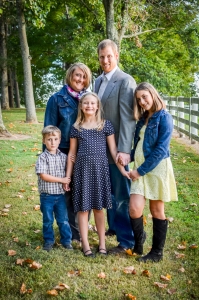I recently heard a speaker refer to the “Nones” as the “new atheist.” I quickly leaned over to my husband and said, “No, that’s wrong. They aren’t atheist. They just see belonging to a church or a denomination as optional to their faith in God.”
Now, in case you’re lost…. a “None” is someone who does not choose to affiliate with a religion. Over the last decade, there’s been a marked increase in the number of people who choose this designation on surveys, especially in the Millennial age group (18-30ish). Atheists claim there is no God, but the diverse group of Nones doesn’t say that. Rather, most say that they do believe in God, but they choose, for a myriad of reasons, not to associate with a specific religion or preference. Even those who say they believe in a Christian God and agree with the tenets of Christianity don’t want to claim a denominational affiliation.
And attendance at a church is…well, optional to their faith.
The latest Pew Research on Religion & Public Life has found that “nearly half (23% of all U.S. adults) say they have always attended religious services at least as regularly as they do now, but slightly more (27% of all U.S. adults) say they now attend religious services more often than they did at some other time in their adult lives.”
However…
Our definition of what a “regular attender” at church is probably varies quite a bit from the definition they used which was “at least once or twice a month.” That’s right. Regular attendance at church is now defined as “once or twice a month.” To me, that is a startling definition. I can’t think of any other social institution that would count “once or twice a month” as regular attendance (unless they are only open once or twice a month). School, clubs, work, sports teams, etc. all require a much higher level of commitment to be considered members, let alone “regular attendees.”
And therein lies much of the struggle and much of the beauty of church.
God does not “require” us to attend church to be members of his body than Jesus. We repeatedly teach that our faith is “by grace through faith” not by works. And while we encourage the participation in the church and we teach on the importance of growing faith within community and we provide deeply needed place of connection so that we don’t walk away from God, church is a voluntary obligation and a place where we have the choice to join or not and still call ourselves a member in good standing.
Well, almost all of us. There is a group that doesn’t really have that choice.
 The choice is made for them because they are young and their parents/caregivers are the ones that must bring them to church and involve them in the faith community.
The choice is made for them because they are young and their parents/caregivers are the ones that must bring them to church and involve them in the faith community.
The children are not given the options that we as adults are. They go where the
parents/caregivers say to go.
So when the parents/caregivers make the church optional, the children do as well. And they can grow up and say things like, “I believe in God, but I don’t think I need to belong to a church to have my own faith.”
Regardless of feelings on this, and there are many, one of the reasons that family ministry has gained traction over the last few years is because this reality has been realized. Coupled with the fact that research both secular and religious consistently find that parents ARE the primary faith formers of their children, it has become evident that in order to reach the children, we must reach the parents.
Last year at the D6 Family Ministry Conference in Louisville, Pastor Robby Gallaty shared:”One of the biggest problems we face in the church is parents who are trying to make disciples with kids but are not being discipled themselves.“
That’s what family ministry is all about.
It’s about reaching a generation of parents/caregivers, equipping, nurturing, and supporting them for the work of discipleship but not by saying, “You’re on your own. You don’t need the church.”
The purpose of family ministry is to put the church at such an integral place in the home and in the family that parents prioritize faith formation and involvement in a faith community in such a way that their children know just how much they need the body of Christ if they are to hold fast to their own faith as they grow.
Re-read that! It is so important to understand this concept if we are going to have healthy conversations about families, and children, and church retention and attendance.
So what does family ministry really say about involvement in a faith community?
Dr. Colleen Derr, also shared at D6 Family Ministry Conference, this nugget I think we all need to grasp: “Family ministry is not ‘dump and run.’” In other words, it’s not “Well, you are the primary faith formers so here you go, you’re on your own. Good luck with those kiddos!”
Sadly, this is a misconception that can sometimes be read into the goal of family ministry, which does put the primary discipleship responsibility in the parent/caregiver’s hands (because its already there by default), but misses the heart of family ministry, which is to work with the parents in a mutually edifying way that leads to disciple-making, not just of children, but of parents WITHIN the context of a local church body.
We are not separate from each other. We are made to be one body in Christ. As Dr. Derr shared, our job as ministers to the family is to find the “common practices, moments, and celebrations” to build upon in a way that doesn’t encourage less church attendance but rather more and more connection to the body of Christ.
We cannot force church attendance and/or more connection to the body of Christ. Christ won’t even force that.
What we can do is be such a pillar of support, nurture, encouragement, equipping, partnership and blessing that parents/caregivers long to bring their children to church to experience that love.
We can do that. So, let’s do that.
Portions of this post appeared here originally last year in an article entitled, “Are We Going to Church?“
For more information about
- Kids in Worship
- Determining which Type of Family Ministry model works best for your church
- Discipleship in Intergenerational community
- Encouraging the continued conversation through Practical Discipleship at Home
- Seminars, Workshops, Coaching
Check out to ReFocus Ministry or “like” our Facebook page. Join our conversation at theReFocus Family and Intergen Ministry group on Facebook.
About this Blog

Refocus Ministry was started by Christina Embree, wife to Pastor Luke, mom to three wonderful kids, and church planter at Plowshares BIC. With years of experience in family ministry and children’s ministry, she is passionate about seeing churches partnering with families to encourage faith formation at home and equipping parents to disciple their kids in the faith. She recently graduated with a Masters of Arts in Ministry focusing on Family, Youth and Children’s Ministry at Wesley Seminary, she also blogs at www.refocusministry.org and is a contributing blogger at D6 Family and Seedbed
 In the meantime, some of the most innovative and creative and downright genius ways to build the church and grow the Kingdom of God are coming from these very people yet their voice gets unheard because, frankly, they just work with the kids. But children’s pastors and youth ministers KNOW that 85% of new converts are between the ages of 4-14 (
In the meantime, some of the most innovative and creative and downright genius ways to build the church and grow the Kingdom of God are coming from these very people yet their voice gets unheard because, frankly, they just work with the kids. But children’s pastors and youth ministers KNOW that 85% of new converts are between the ages of 4-14 (
 But there’s more good news too!
But there’s more good news too!